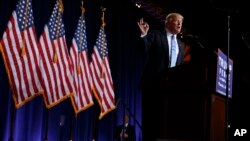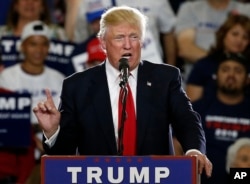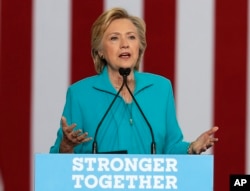Republican presidential candidate Donald Trump Wednesday night laid out an immigration policy prioritizing border security and ensuring that those who enter the United States share the country's values.
He spoke to supporters in the southwestern state of Arizona in much more forceful language than he did hours earlier in Mexico City where he held what he called "important and straightforward" talks with Mexican President Enrique Peña Nieto.
A prime example of the divide was Trump's longstanding pledge to build a wall at the U.S.-Mexican border. Trump said after the meeting that he and Peña Nieto discussed the plan, but not Trump's assertion that Mexico will cover the cost. Peña Nieto, however, said he made clear Mexico will not pay for it.
But when Trump revealed his 10-point immigration plan in Arizona, the "tall, powerful, beautiful" wall was first.
"They don't know it yet, but they're going to pay for the wall," he said. The crowd enthusiastically chanted, "Build that wall!"
Democratic candidate Hillary Clinton's campaign chairman John Podesta said Trump "choked" by not fully addressing the issue with Peña Nieto.
"What we saw today from a man who claims to be the ultimate 'deal maker' is that he doesn't have the courage to advocate for his campaign promises when he's not in front of a friendly crowd," Podesta said.
After weeks of reports that Trump might be softening his immigration platform, he proposed Wednesday night hiring 5,000 new border patrol agents, tripling the number of immigration enforcement officers and immediately deporting anyone caught illegally entering the country. He said crime and border crossings would plummet and gangs would disappear.
"People will know that you can't just smuggle in, hunker down and wait to be legalized," he told the crowd in Arizona.
The issue of what to do with the estimated 11 million people already living in the United States illegally is a divide between Trump and Clinton. Both want to deport those who have committed crimes, but Trump objects to executive orders signed by President Barack Obama offering deferred enforcement to certain categories of people with no criminal record. Clinton wants to protect them, which Trump has labeled as "amnesty."
"No one will be immune or exempt from enforcement," he said.
Trump called for the completion of a biometric entry and exit system to better track those who enter the country, and for the expansion of e-verify systems to help employers avoid hiring illegal immigrants.
He also reiterated plans to suspend the issuing of visas to those living in countries where people cannot be adequately screened to ensure they are not a security risk. Those admitted to the U.S. would have to pass ideological tests as well.
"We also have to be honest about the fact that not everyone who seeks to join our country will be able to successfully assimilate."
Trump said he does not want to accept refugees from places like Syria and Libya, instead proposing "resettlement zones" in their home region paid for by Gulf states. In short, he described his policy as taking back the country.
"We will treat everyone living and residing in our country with great dignity," Trump said. "We will be fair, just and compassionate to all, but our greatest compassion must be for our American citizens."
Lorella Praeli, Clinton's Latino vote director, said after the speech that the only immigrants allowed under Trump would be those he finds desirable.
"Donald Trump once again showed us that he will continue his decades-long record of divisiveness and campaign of hate by pledging to forcibly remove every single undocumented immigrant from our country," Praeli said. "He showed us, very clearly, what's at stake in this election by painting a picture of his idea of America: one in which immigrants are not welcomed and one in which innocent families are torn apart."
At Clinton's own rally Wednesday, she described the U.S. as a global force for "freedom, justice and human dignity," saying people look to the country as a leader. The former secretary of state criticized Trump's visit to Mexico by saying building relationships requires consistency and reliability.
"It certainly takes more than trying to make up for a year of insults and insinuations by dropping in on our neighbors for a few hours and then flying home again. That's not how it works," she said.
Later Clinton tweeted that Trump had failed his first test of foreign policy.
"Diplomacy isn't as easy at is looks," she wrote.
Peña Nieto has invited Clinton for talks in Mexico City as well, but her campaign has not commented on whether that will happen.
The Mexican president said during a news conference with Trump that his priority is protecting Mexicans wherever they may be and that those living in the U.S. are talented and honest people who respect family, their communities and the law.
Peña Nieto also called the border an asset for both countries. He said Americans who see it as a path for drugs and illegal immigrants are getting an "incomplete picture" and that the U.S. must do what it can to stop weapons and money from flowing to drug cartels in Mexico.
Miguel Tinker Salas, a professor of Latin American studies at Pomona College, said the meeting in Mexico City was a largely symbolic event in which both sides could claim they defended their interests.
"For Trump, it shows him as someone willing to fly to Mexico and engage with these issues so that actually Trump will in some ways attempt to utilize this to appear presidential," he told VOA. "Peña Nieto I think is the larger loser in this process because he gets really very little out of this except to say that he was defending Mexico's honor and interests."
Recent polls of registered U.S. voters have shown that immigration matters much more to Trump's supporters than to Clinton's.
Tinker Salas said there is no chance Latinos will vote for Trump in large numbers in November, but noted that many have reservations about supporting Clinton because her pledge to introduce immigration reforms in the first 100 days of her administration sounds like a pledge that Obama made but did not fulfill. He also cautioned against portraying Latinos as solely interested in immigration, saying that it is only the fourth or fifth most important issue to most people.
"They are very similar to every other group in the U.S. They want a good education, want good employment, good housing opportunities and a good life in the U.S. It's not a one-issue community," Tinker Salas said.







